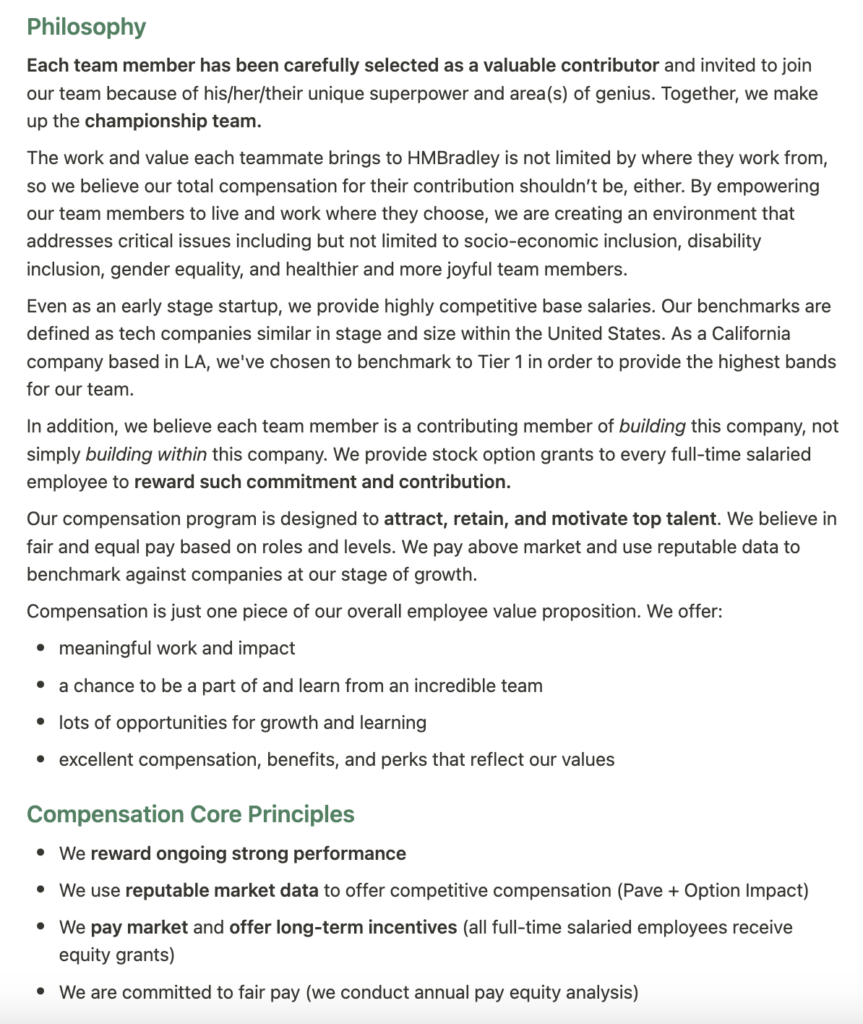
My company doesn’t have a compensation philosophy. How can I, as a hiring manager, encourage my HR team to establish this?
Erin Hubbard McCann, Head of People Operations at 86 Repairs:
For hiring managers, you’re the voice for HR to your teams and you need to feel educated and ready to answer inevitable compensation questions that will arise to ensure you are aligned.
If you have an HR partner, I’d recommend sharing IRL examples of where this could have been useful and ask if you can help support them in growing/building their compensation philosophy. Maybe they have one and they didn’t share it? Perhaps it’s in flight?
In People/HR, it’s always good to have a champion and I’d relish having a manager lean in with me (rather than pointing fingers that I’d missed something). How can you help each other?
Lauren Batcheck, VP of People at HMBradley:
Always Start with Why: Building an intentional compensation philosophy with shared principles and commitments aligned with your company’s values is important for establishing a clear why behind (and the context for) how compensation decisions are made. By rooting your compensation strategy and formula in that philosophy, it helps create trust, inclusivity, transparency, clarity, and accountability across the team for fair compensation practices, and mitigating unconscious bias in compensation decisions and the compensation minority gap.
philosophy >> strategy >> formula
why >> what >> how
Here are a couple examples:



I think for many employees pay transparency means literally knowing colleagues’ specific salaries. Can you speak more to this/offer potential response?
Ciara O’Sullivan, Director of People at Bilt Rewards:
Pay Transparency means understanding your value and feeling valued by your organization in return.
It is important that organizations are transparent about what people are paid at various levels + what qualifies you to be in a certain level. Sometimes these things can be ambiguous depending on organization size, but as an org grows this becomes critical. On the flip, this means that as the employee, you are being honest with what you bring to your organization. Certain directors will be paid more based on the department they’re in and that’s the nature of the beast. You should work with your manager to understand where you currently sit, how you’re being perceived and what you’ll need to do to increase in value.
Alex Clermont, Practice Manager at TDC:
Often true pay transparency does result in knowing or being able to figure out roughly what other people are paid – and that’s okay. For instance, we’re billable and you can pretty much suss out everyone’s salary from their billable rates. What we publicly offer are pay bands, general responsibilities for different roles, and regular conversations about upward mobilities. But sometimes for parity, you also need to know what people within your band are making relative to yourself to verify that all the men aren’t getting paid more or there isn’t another form of disparate impact happening – and I wouldn’t want employees to just blindly trust their employers when they say things are fair.
The balance between transparency and privacy is tricky, but the impacts of not being transparent can be so huge that I personally err away from privacy. Though again, my company is set up to make that easy.
Erin Hubbard McCann, Head of People Operations at 86 Repairs:
JOIN 130K+ HR LEADERS
Get insights, learnings, and advice on how to build companies and cultures that people actually love.
No spam. Unsubscribe any time.
I think this will largely depend upon the company; I’ve worked in environments where everyone voluntarily shared their pay and others where that would have created distractions, resentment, and anxiety.
Mostly: folks feel compensation is murky. How can we as People professionals educate them given we live this stuff every day?
There are a few components I think every company can lean into though to eliminate pay opaqueness and get more candid about compensation.
- Compensation philosophy: Share how the company determines what someone should be paid. For instance, what markets geographically; what percentile. You can get granular about the process for establishing salary ranges so folks can get educated on it. Folks often feel underpaid because they don’t have perspective on the “why”.
- Sources: Sharing what sources are being used will lend credibility to the process; use several and compare. For instance, Pave, Radford, Lattice Compensation, and even Built In sites. Note that your company will filter to compare companies that are close in stage, size, or value (if you do).
- Consistent Titling: Once you unlock this information, folks will start researching so I’d recommend crafting a basic title structure that is consistently used. That doesn’t necessarily mean re-titling folks; more so, what do you call entry, mid, senior, and leadership folks? How does that track in the market?
- Earning power: If folks are asking for transparency, often it’s so they can understand if they’re paid fairly. They also want to know how to increase their own pay so perhaps include that as part of the compensation philosophy. Do you pay for performance or tenure? How do you “level up”?
Managers are critical in changing or introducing compensation processes so they too need to be ready with discussion points and scripts on how to discuss compensation when they are asked. Consider leaning into role plays and training here before rolling out something broad to the team. Managers are your voice and they need to feel prepped!


